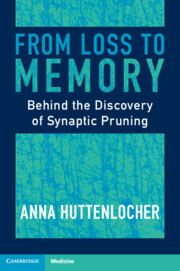Book contents
- From Loss to Memory
- From Loss to Memory
- Copyright page
- Dedication
- Contents
- Preface
- Acknowledgments
- 1 Counting Synapses
- 2 Discovering Synaptic Pruning
- 3 Else, Peter’s Mother
- 4 Richard, Peter’s Father, and Peter’s Uncle Fritz
- 5 Greiz: Kriegskinder (Children of War)
- 6 In Braubach, after the War
- 7 Arrival in America
- 8 Harvard Medical School
- 9 Understanding Sleep and Consciousness: Research at the National Institutes of Health
- 10 Entering the Cognitive Revolution: Neuroscience and Cognitive Psychology
- 11 Physician First, Scientist Second?
- 12 Comparative Brain Regions and Synapse Formation
- 13 Stimulating Progress on Developmental Brain Disorders
- 14 Neurodevelopmental Disorders and Schizophrenia: A Role for Synaptic Pruning?
- 15 Early Childhood Education
- 16 Peter and Janellen’s Collaboration
- 17 Microglial Cells and the Mechanisms of Synaptic Pruning
- 18 Looking Forward: Being a Physician and a Scientist
- 19 Parkinson’s Disease and Berlin
- 20 Auf Deutsch: Back to German
- 21 Memories and Reflections at the End: A Return Trip to Greiz
- Glossary
- Index
- References
15 - Early Childhood Education
Published online by Cambridge University Press: 10 October 2023
- From Loss to Memory
- From Loss to Memory
- Copyright page
- Dedication
- Contents
- Preface
- Acknowledgments
- 1 Counting Synapses
- 2 Discovering Synaptic Pruning
- 3 Else, Peter’s Mother
- 4 Richard, Peter’s Father, and Peter’s Uncle Fritz
- 5 Greiz: Kriegskinder (Children of War)
- 6 In Braubach, after the War
- 7 Arrival in America
- 8 Harvard Medical School
- 9 Understanding Sleep and Consciousness: Research at the National Institutes of Health
- 10 Entering the Cognitive Revolution: Neuroscience and Cognitive Psychology
- 11 Physician First, Scientist Second?
- 12 Comparative Brain Regions and Synapse Formation
- 13 Stimulating Progress on Developmental Brain Disorders
- 14 Neurodevelopmental Disorders and Schizophrenia: A Role for Synaptic Pruning?
- 15 Early Childhood Education
- 16 Peter and Janellen’s Collaboration
- 17 Microglial Cells and the Mechanisms of Synaptic Pruning
- 18 Looking Forward: Being a Physician and a Scientist
- 19 Parkinson’s Disease and Berlin
- 20 Auf Deutsch: Back to German
- 21 Memories and Reflections at the End: A Return Trip to Greiz
- Glossary
- Index
- References
Summary
The concept of synaptic pruning had an impact on mainstream thinking about early education soon after its discovery. The fact that millions of synapses are eliminated between early childhood and adulthood was mind boggling. But conceptually, it made sense that the brain circuitry starts with more connections than are needed, and subsequently can be sculpted based on input. Although it may seem inefficient, the early overabundance of connections enables a process for selective elimination and refinement that occurs over years, as children learn. But how does synaptic pruning relate to childhood learning? Education scholars and advocates had for centuries been alert to the positive impacts of education on child development. In 1979, education initiatives such as the Head Start program in the United States. were already in place. The discovery of synaptic pruning then supplied a new and specific biological basis supporting the benefits of early childhood education.
- Type
- Chapter
- Information
- From Loss to MemoryBehind the Discovery of Synaptic Pruning, pp. 100 - 103Publisher: Cambridge University PressPrint publication year: 2023



